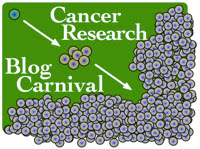 Welcome to the 23rd edition of the Cancer Research Blog Carnival! Most of our readers are probably either recovering from Canada Day or gearing up for Independence Day, but there's always time for some science in between.
Welcome to the 23rd edition of the Cancer Research Blog Carnival! Most of our readers are probably either recovering from Canada Day or gearing up for Independence Day, but there's always time for some science in between.Kicking things off this month, we have PalMD following up on his Cancer 101 posts (some of which were featured previously in the Cancer Carnival) with Cancer 202 - Radiation Therapy. In it he briefly discusses the basics of radiation treatment including its effects on normal tissue and how to target a tumour.
Radiation is a powerful tool in medicine, but like any tool, whether it be a knife or a pill, it must be wielded properly and ethically. The best medicine combines good science, compassion, and ethical behavior to help people. Radiation therapy is one of medicine's most sophisticated techniques, and must be used only by certain experts. It's also really cool.PalMD does a great job of explaining the basics in an easy to understand way. If you missed any of the other posts in this series, check them out here.
Next up, MolBio Research Highlights sends us some blogging on peer reviewed research. The topic? Cancer Stem Cells. Francisco Barriga is inspired by three recent papers and tries to make sense of it all with a nice review of current thinking and controversy.
[D]uring the last years there has been a lot of controversy regarding the existence, function and clinical implications of cancer stem cells. This confusion stems (no pun intended) from the lack of clarity in the field nowadays, arising mainly from misconceptions regarding the origin and function of these cells. On top of all of this is the confusion derived from media-hype and some not-so knowledgeable scientific journalists.Francisco clears up some of this confusion with a summary of the cancer stem cell hypothesis and discussion of unresolved issues in the field.
Cancer stem cells are always a hot topic, and Alexey at Hematopoiesis discusses some ways that existing drugs can affect CSC populations.
Recently, anti-cancer activity of some well known drugs was discovered, which was shown to rely on targeting of cancer stem cells (CSC). Explanations for some very effective anti-leukemic drug combination were recently found in the laboratories. I’ll give you some examples of “from-bed-to-the-bench” translation coming from leukemia clinic.Three drugs, and their possible uses, are examined.
Over at Scienceblogs, there has been some discussion about NIH funding strategies, and whether they're too conservative. Mike the Mad Biologist draws our attention to a New York Times article that laments the lack of progress in cancer cures and wonders if more money should be put into high-risk, high-reward projects. Orac comments on the same article, asking "Are we playing it too safe in cancer research?" and the Mad Biologist continues his analysis of the culture of caution at the NIH.
Finally, there were celebrity deaths in the news last week with one, Farrah Fawcett, losing her battle with cancer at the age of 62. While it was overshadowed by other events, she did get some attention with some raising awareness about anal cancer, some retrospective and discussions with her oncologist.
That's it for this month. Next month is our the Cancer Research Blog Carnival's 2nd anniversary, so start writing those cancer posts, and submit them here. We always need hosts as well, so if you're sick of seeing the carnival here on the Bayblab, email us to sign up for a future carnival. For older editions, visit the Carnival Homepage.
And don't forget, the Cancer Research Blog Carnival now has subscription options; you can follow by email or RSS feed. An aggregated feed of credible, rotating health and medicine blog carnivals is also available.

 Podcast
Podcast




2 comments:
http://bayblab.blogspot.com/2009/07/cancer-carnival-23.html
The American Cancer Society recommends that you:
* Eat an abundance of foods from plant-based sources. Eat five or more servings of fruits and vegetables each day. In addition, eat other foods from plant sources, such as whole grains and beans, several times a day. Replacing high-calorie foods in your diet with fruits and vegetables may help you lose weight or maintain your weight. A diet high in fruits and vegetables has been linked to a reduced risk of cancers of the colon,ovarian cancer, esophagus, lung and stomach.
* Limit fat. Eat lighter and leaner by choosing fewer high-fat foods, particularly those from animal sources. High-fat diets tend to be higher in calories and may increase the risk of overweight or obesity, which can, in turn, increase cancer risk.
* Drink alcohol in moderation, if at all. Your risk of cancers, including mouth, throat, esophagus, kidney, liver and breast cancers, increases with the amount of alcohol you drink and the length of time you've been drinking regularly. Even a moderate amount of drinking — two drinks a day if you're a man or one drink a day if you're a woman, and one drink a day regardless of your sex if you're over 65 — may increase your risk.
Post a Comment